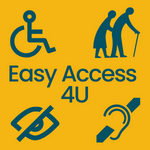People WithTraumatic (or acquired) Brain Injury
PEOPLE WITH TRAUMATIC BRAIN INJURY have had damage to the brain usually as the result of trauma, such as an accident or stroke.
Some of the factors that affect people with learning disabilities also apply to people with traumatic brain injury. People with brain injury may have a loss of muscle control or mobility that is not obvious. For example, a person may not be able to sign her name, even though she can move her hand.

A person with a brain injury may have poor impulse control. The person may make inappropriate comments and may not understand social cues or “get” indications that she has offended someone.
In her frustration to understand, or to get her own ideas across, she may seem pushy. All of these behaviors arise as a result of the injury.
A person with a brain injury may be unable to follow directions due to poor short-term memory or poor directional orientation. She may ask to be accompanied, or she may use a guide dog for orientation, although she does not appear to be mobility impaired.
If you are not sure that the person understands you, ask if she would like you to write down what you were saying.
The person may have trouble concentrating or organizing her thoughts, especially in an over-stimulating environment. Be patient. You might suggest going somewhere with fewer distractions.
